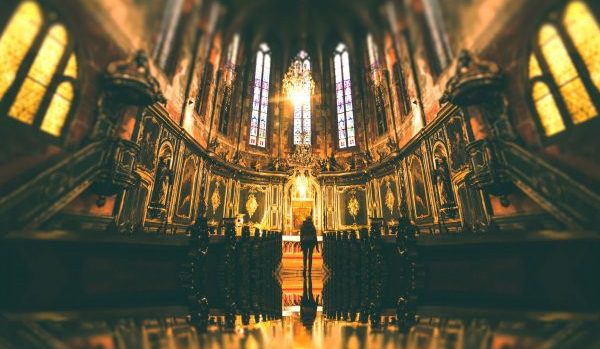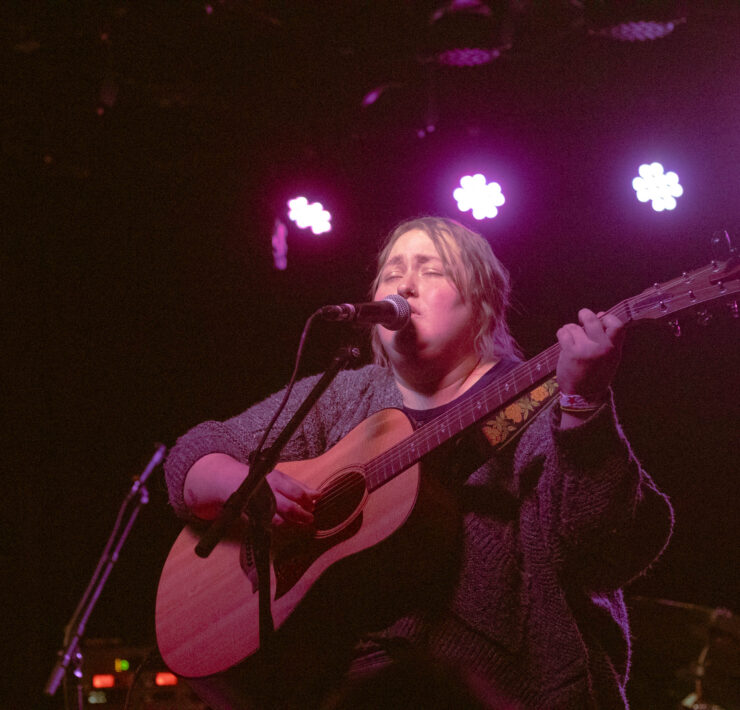Evangelical Denver Community Church Opens It’s Arms to the LGBTQ Community

On a recent Sunday, I crept awkwardly up the steps of Denver Community Church. Despite my internal pep-talks, I was hesitant: as a gay, liberal Jew, I couldn’t help but feel just a little uncomfortable venturing boldly forth into an Evangelical Sunday service. But I reminded myself why I was there: DCC had recently come out, if you will, as fully inclusive members of the LGBTQ community, welcoming us queer folk into the fold at any and all levels of leadership. And I wanted to check it out.
Many in the LGBTQ community share my hesitancy toward faith communities, especially toward the Church, and with good reason. Michael Hidalgo, lead pastor at DCC, gets that.
“The Church,” he said, was founded on the “wild love of Jesus Christ.” But he acknowledges that in the past several centuries, it has been used to “build walls rather than pathways.”
As a leader in the Church, Hidalgo owns that. And with DCC’s new stance as fully inclusive of the LGBTQ community, Hidalgo and other church leaders are trying to change things.
While DCC may not be the first Evangelical church to welcome us LGBTQ folk, they’re not exactly following a time-honored tradition. So how did this change come about? Slowly, it seems, and carefully.
The church leadership team, composed of Hidalgo, two other pastors, and the eight-member elder team, underwent a ‘period of discernment,’ during which they met twice a month for almost two years to study and discuss and learn. Throughout this time, the group was careful to remember that they weren’t just discussing an ‘issue’; they were discussing the lives of actual people.
They invited LGBTQ Christians to their meetings to share their experiences and viewpoints. They took another look at the Bible, examining six verses in particular that are often interpreted as condemning homosexuality. Is that really what those verses were saying? Was there perhaps a different meaning behind them, one that would say it’s okay to be queer?
It’s a big step to go from the relatively conservative, Christian upbringings of Hidalgo and Pastor Jon Gettings, another member of the lead team, to helping steer a congregation through a period of turbulence and come out more accepting on the other side.
Both men mentioned that it was experience with individuals that helped open their own minds.
For Hidalgo, it was coming to know a couple of godly men who were role models to him. And who happened to be a gay couple. For Gettings, it was when his brother-in-law came out. Gettings also acknowledged that many people of faith adopt a belief system that has been handed down to them fully formed; they don’t necessarily interrogate those beliefs. When he began to think critically about the inclusion of LGBTQ folks in the Church, his mind began to change.
Depending on your memories of Sunday school (or lack thereof), words like ‘exegesis’ and ‘hermeneutics’ might make your eyes roll back in your head. Or they might just make you scratch your head. Both more or less mean the interpretation of text, especially biblical text.
Okay people. Don’t you dare get bored and skip this section. This is quite literally a matter of life and death.
What is it that has allowed the Church to justify the abuses it has perpetuated over the centuries? At the risk of oversimplification, it’s the way that it has interpreted the Bible. But then again, what is it that is allowing DCC to now open its arms to us queers?
Well, a reinterpretation of that same book. And while we’re on the subject, what is it that allows the courts to justify keeping guns in the hands of their owners? How is it that we can have laws allowing or forbidding abortion? How did Judge James Robert rule Trump’s travel ban illegal? Hermeneutics! Only now, the text is the Constitution (and other legal documents), rather than the Bible. Bet you’re reading now.
So how do Hidalgo and Gettings, men who lead a congregation of close to 2,000, based on a text that is almost 2,000 years old and written in an incredibly different time and cultural context, think about text? If the Bible (or any text) can be reinterpreted as time goes, how is it a solid enough foundation to base entire lives off of? How is it solid enough to tell some people that they’re okay, and others that they’re not? But then again, if a text is set in stone, how can it possibly remain relevant across time and around the globe?
Hidalgo mentioned that the Bible doesn’t change, but we can understand it differently as our consciousness grows. He drew an analogy to his son. While Hidalgo has always spoken to the 14-year-old the same way, his son has been able to understand Hidalgo’s words differently as he’s grown.
Gettings also mentioned a changing interpretation. For him, we interpret the Bible through the lens of our time and place. He mentioned that the Bible is not a rulebook telling us how to behave — it tells us how to believe.
None of this was quite enough to convince my lefty brain of the authority of text, but the next thing Gettings mentioned did resonate with me. People, he said, need boundaries in order to feel safe. Foundational texts can act as those boundaries, drawing a clear line between ‘us’ and ‘them.’ As long as there is a ‘them,’ ‘we’ are okay.
So when a church reinterprets those infamous six verses to make monogamous same-sex relationships just as kosher as their heterosexual counterparts, some Christians are into it. But some get worried: if what used to be part of ‘them’ is now part of ‘us,’ then how do we know that ‘we’ are still okay?
“We just widened the tent,” Gettings said.
It’s been almost four months since this announcement, so how has DCC changed? In a lot of ways, it hasn’t. Hidalgo mentioned that several congregants had been under the impression that the church was already fully inclusive. But both Hidalgo and Gettings were able to provide examples of change, both positive and negative.
Hidalgo shared the story of a lesbian couple who have been attending DCC for a while now. After the announcement, the two came with tears in their eyes to receive communion together for the first time. Gettings said that in their latest Ministry training, a meeting for new or prospective members, a quarter of the participants were LGBTQ. But it hasn’t all been rainbows and sunshine. Gettings mentioned a few congregants who met with him to “speak at” him, rather than to engage in dialogue, and Hidalgo maintained that some congregants had decided to seek community elsewhere; the portion of their budget that comes from congregant donations has shrunk by somewhere between 20 and 30 percent.
Still, both men affirm that so far it has been a “beautiful journey.” And perhaps most importantly, Gettings mentioned that, although the opposite message is often sent, DCC wants members of the LGBTQ community to know that “followers of Jesus care for you and want you in the community.”










